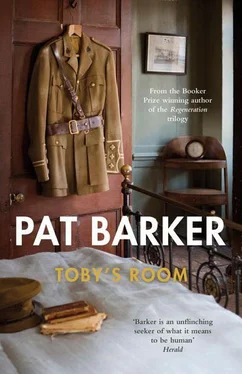‘No, this is fine.’
‘I never thought … Anyway, I’ll leave you to it. There’s some kind of stew for dinner. No idea what it is, I just warm them up. But the wine’ll be good, I can promise you that.’
And flow freely, no doubt. But who was he to criticize? He was drinking far more than he should.
After Neville had gone, Paul began transferring clothes from his bag to the wardrobe by the bed. The room smelled sweet, though he couldn’t tell where the smell was coming from. Nothing obvious like potpourri or lavender, but it was very pleasant. In fact, the whole room was pleasant: plain, solid furniture, a white coverlet on the bed, a faded blue rug on the polished-wood floor. No, it was good. He could have been happy here, if it wasn’t for the thought of what awaited him downstairs.
Talking about the prostitute like that … That was Neville all over. The first time Paul had met him, oh, years ago — before the war — he’d told some sort of story against himself, without appearing to realize how damaging it was. Something about a model he’d got pregnant, or somebody had got pregnant, and he was refusing to pay … Yes, that was it. He was refusing to support the child. What a thing to say to a complete stranger. Of course, he had no reason to look down on Neville because he’d visited a brothel. In France, after Elinor stopped writing, he’d used prostitutes himself for a time. Sheer misery; nothing else sluiced away the blood. He didn’t think he’d bullied them, though … Ah, well. No doubt they’d get through the evening somehow.
Paul switched off the light, but before going downstairs he crossed to the window and looked out. Even on this comparatively calm night, there was a line of white foam where the sea chafed against its bonds. On the ground, you felt safe behind that ridge of shingle, but up here you could see how vulnerable the town really was.
Dropping the blackout curtain, he groped his way along the edge of the bed until he found the door. Using the banisters as a crutch, he hobbled downstairs and followed Neville’s voice into the kitchen where he saw an improbable figure with an apron tied around its waist, hunched over the range stirring a black pot.
‘How now, thou secret, black and midnight hag?’
Neville glanced up. ‘Beef,’ he said. ‘I think.’
Over dinner and a bottle of decidedly robust red wine they talked about painting and painters. Neville’s opinions were always entertaining, if vituperative. At one point, Paul realized that Neville didn’t believe anybody could paint — except, of course, himself. Even the great painters of the past were merely hauled into the light and damned with faint praise, before being tossed, almost casually, on to the muckheap of history. ‘Past, Tarrant,’ he kept saying. ‘Past. Done with. Over.’
It was an extraordinary performance and one that left Paul almost gasping with disbelief.
‘I’m hoping to get some reviewing soon,’ Neville said. ‘Fact, I want to do quite a bit of journalism in the future. Sort of thing I can pick up and put down, you know, because I’m going to be in and out of hospital for the best part of next year. And they’ll have to let me out to go to the exhibitions.’
‘Sounds like a good idea.’
Please, God, don’t let him review me .
‘What are you doing?’ Neville asked.
‘Painting? Landscape around Ypres.’
He was braced for some gibe about the past-ness of landscape painting, but instead, Neville lapsed into silence, and for a moment the two of them sat there, each lost in his own memories of the ruined city.
Neville roused himself. ‘Can I top you up?’
‘Yes, all right, go on.’
‘So, anyway, your dinner?’
‘Sorry?’
‘You said you had dinner with Michael Corder.’
‘Oh, yes, so I did. Dried-up little prude that I am. He lost an arm, you know. Arras. Anyway, it was quite interesting because we were talking about whether anything positive’s come out of the war — apart from the fact that you can see women’s legs and you couldn’t before — and he said he wouldn’t have missed it for the world. I just sat there and looked at his empty sleeve. But that’s it, isn’t it? A lot of people want to believe they’ve got something good out of it. That they’re better people, less selfish …’
‘I’d settle for my nose.’
Back in the living room, Neville built up the fire and sat back in an armchair, but he was fidgeting all the time. In pain. Paul knew the signs.
‘So what do you think you can get away with?’ Neville said.
‘Sorry?’
‘What will you paint?’
‘It’s all fairly straightforward. No bodies. You can show the wounded, but only if they’re receiving treatment. I think in practice that means bandages.’
‘So no wounds, either?’
Paul shrugged. ‘I don’t know. It hardly applies to me.’
‘Well, I intend to push it as far as I can.’
‘Why, what’s the point? If you push it too far they won’t let you show it. Besides, you can get round it …’
‘You can. Your landscapes are bodies.’
‘Yes, I know. Don’t worry, it’s intended. I know what I’m doing. It’s the Fisher King. The wound in his thigh?’
‘Balls.’
Paul looked surprised. Even by Neville’s standards that was forceful.
‘That’s where the wound is. Idiot. He was castrated.’
‘Oh, all right, then, balls. The point is, the wound and the wasteland are the same thing. They aren’t metaphors for each other, it’s closer than that. Anyway, you do the same thing. All those mutilated machines.’
‘My machines aren’t mutilated, they’re triumphant.’
‘At least you’re working again.’
‘Yes, I suppose I have to be grateful for that.’
Neville lapsed into silence. A few moments later he said, ‘Have you thought what you’re going to do after the war?’
‘No point.’
‘Surely you can think about it?’
‘No, I can’t. I take it you can?’
‘Oh, God, yes. Minute it’s over, I’m out of here.’
‘Here? You mean, London?’
‘England. I want to go somewhere where you don’t have the past sitting on the back of your neck like a fucking dead weight. New York, Chicago. We’re a nation of fucking caryatids. It’s squashing us. Can’t you feel it?’
‘Well,’ Paul said, ‘I’m impressed. I’ve never managed to see beyond it.’
All these past weeks he’d been trying to fit back into civilian life. It had been like poring over a chessboard, always trying to work out the next move, the winning strategy, and now, with one great sweep of his arm, Neville had scattered the pieces. You don’t have to play this game, he’d said. There are other places. Other games.
I never did fit in , he thought. He’d always been a ‘temporary gentleman’. And as long as he remained in England he’d never be anything else. So why not move on? New York? Chicago? No, not for him. He knew immediately, without having to think about it, that he wanted the south: warmth, sunshine, lemons growing on trees. He’d never been anywhere like that. Never been anywhere at all, except France and Belgium, and even those countries he’d experienced as a succession of holes in the ground.
‘You’re right,’ he said. ‘I ought to think about it.’
They went to bed, predictably drunk, an hour later. Around two in the morning Paul woke to a loud thud. For a second he was back in the trenches, shells falling all around, but then his splayed fingers encountered clean, crisp sheets and he thought: England. Home . He was sweating so he pushed the bedclothes down, trying to get cool. The blackout curtains were so effective he could see nothing in the room, not even shadows. His face was pressed into a smothering pelt of darkness. He lay listening, straining to identify the sound that had awoken him.
Читать дальше












